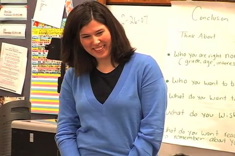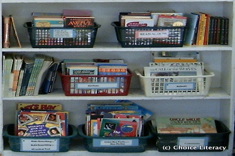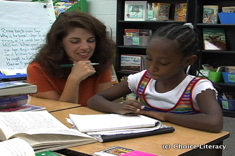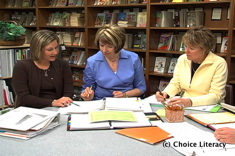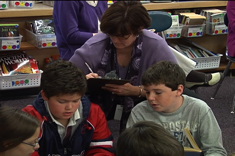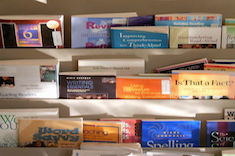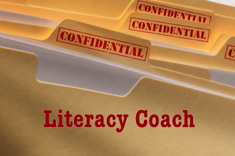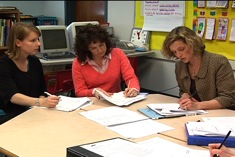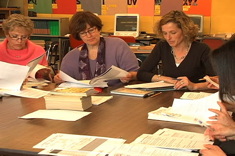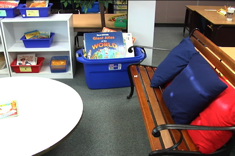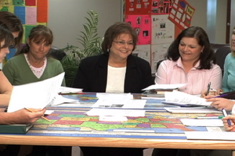Leadership
Do you guide teachers, specialists, and literacy coaches? Here are tools, advice, and strategies school leaders need for their daily work in staff meetings, study groups, and one-on-one discussions with colleagues. If you have a leadership role in coaching teachers and designing professional development, you'll want an upgraded membership with access to our Leaders Lounge.
Latest Content
Mentoring from the Real to the Ideal: Mental Images of Teaching
We know the power of mental images as a strategy for helping readers comprehend difficult text. Suzy Kaback uses a similar technique to help novice teachers envision success. Thisl is an activity you might want to try with a new teacher group.
Out of the Closet and into the Classroom: Bookroom Management Tips for Literacy Coaches
Is your system for sharing books from a school bookroom or literacy closet working well? Shari Frost provides 10 practical tips for getting the best use out of shared literacy resources.
Towards Thoughtful Strategy Instruction
Sometimes the pendulum swings so hard in education that it’s hard not to feel whiplash. Shari Frost considers critiques of strategy instruction, analyzing what’s valid and what’s not in attacks on the flurry of post-its in classrooms.
What Goes in the Writer’s Notebook?
Aimee Buckner chats with colleagues about notebooks, and finds herself rethinking what she puts in her notebook (as well as what she requires of students).
Tips for More Effective Debriefing Sessions
Clare Landrigan and Tammy Mulligan share strategies and seven different observation templates for participants to download and try out.
Expectations for Grade-Level Team Meetings
Tammy Mulligan and Clare Landrigan share their top tips for improving team meetings.
Unlucky Lists: Raising Non-Writers and Non-Artists
These lists created by S. Rebecca Leigh are a fun way to size up the messages we send students about reading, writing, and drawing, and how these may influence lifelong literacy habits.
Creating Data Teams
Literacy leaders are spending more and more time organizing, compiling, and storing assessment data, often leaving little time to analyze the findings with teachers. Clare Landrigan and Tammy Mulligan explain the value of enlisting tech support to assist with the data load.
Making the Case for Literacy Coaches
If your district is considering cuts to its literacy coaching program, you’ll appreciate Shari Frost’s advice.
My Colleague Refuses to Collaborate with Us (LITERACY COACH CONFIDENTIAL)
What do you do about a colleague who refuses to collaborate with other teachers on her grade-level team? Literacy Coach Confidential takes on the problem, with suggestions from seven Choice Literacy contributors.
Opening Classroom Doors
Clare Landrigan and Tammy Mulligan share many nonthreatening techniques to break down resistance among teachers to classroom visits and collaboration.
What Reading is Like: Sports Analogies to Use with Parents
Clare Landrigan and Tammy Mulligan provide some sports analogies to share with families when talking about reading growth. The article includes a handout of prompts parents can use to spark discussions about books with their children.
Building a Professional Library from Scratch
There are so many new professional books available for literacy leaders to purchase…and so little funding to buy them. Shari Frost gives the details of how one coach surveyed colleagues, assessed needs, and rooted out bargains before spending the precious $500 allocated for stocking the professional book library.
Eight Tips for Building Relationships: A Tale of Two Literacy Coaches
Shari Frost presents a tale of two literacy coaches – one who has had success building close relationships with colleagues, and one who has struggled. In analyzing their experiences, she presents eight practical strategies for building relationships over time.
The Bed and Breakfast Model: An Analogy for Schools
Have you ever struggled as a literacy leader to explain the balance between creativity and common standards in teaching; between shared expectations and individuality? Clare Landrigan and Tammy Mulligan present an analogy that might help.
Literacy Coach Confidential: My Colleague Talks Too Much!
Yakity yak won't bring 'em back to study groups when someone talks far too much. Here is advice from Choice Literacy contributors on how to deal with those "overtalkers" with tact and grace.
Self-Fulfilling Prophecies: Recommending Yourself
Suzy Kaback asks her students to write letters of recommendations for themselves, and finds that the activity ripples across the school mentoring community. This exercise is a terrific catalyst for creating personal improvement plans.
What’s the Most Beautiful Thing You Know About…?
Ruth Shagoury and Melanie Quinn asked their colleagues to share the “most beautiful thing” about the puzzling student each of them is looking at closely in their study group. This is a great activity you’re looking for a quick and easy icebreaker to spark some positive energy in your next study group or staff meeting, and remind everyone of the joys of our profession.
A Reason to Learn
Jennifer Allen reflects on why and how literacy leaders need to make their professional development offerings more relevant and rigorous for teachers.
If Boot Camp Was Standards-Based
Franki Sibberson's article this winter linking her learning from fitness boot camp to working with struggling readers was one of our most popular features ever. Here she provides a follow-up to share new lessons from bootcamp in a standards-based world.
From “Data Drowning” to “Data Wise”: What Are We Doing Now?
Clare Landrigan and Tammy Mulligan provide an activity for staff meetings designed to help schools sort through the purpose and value of current assessments.
Inspiration from Author Visits: Tips and Web Resources
Jennifer Jones reflects on the power of a local author visit in her school, and also provides some quick tips and weblinks for planning a visit.
Better Discussions in Study Groups
Cindy Hatt has suggestions for getting the most out of book studies with colleagues, with activities and prompts that can help you move from ideas to practice in classrooms.
Tips for Saving Time from Literacy Leaders
Time-saving tips from contributors including Aimee Buckner, Debbie Miller, Ruth Shagoury, Shari Frost, Karen Szymusiak and "The Sisters" (Gail Boushey and Joan Moser).
Moving from Data to Practice
Clare Landrigan and Tammy Mulligan give advice for how to create databases and graphic analyses of assessment information that teachers can readily access and use.
Music for Literacy Leaders
Reflective? Rollicking? If you’re trying to set a tone for anything from an assessment team meeting to a one-minute transition in a second-grade classroom, our Music for Literacy Leaders playlist has just the right song for you.
Aligning Curriculum with Struggling Readers in Mind
This is a terrific article for a team considering struggling learners to read together and discuss. Franki Sibberson asks some critical questions, including how many transitions and different adults some children work with each day in the name of getting all the support they need.
Back to the Classroom
Shari Frost reflects on what went wrong (or right) when a literacy coach decides to return to the classroom, and in doing so considers the kind of support literacy coaches need to thrive.
From Congeniality to Collegiality: Protocols for Meetings and Observations
Clare Landrigan and Tammy Mulligan suggest a few tested and successful protocols for meetings and study groups that foster more thoughtful conversations.
Hallmarks of Reading Workshop
Karen Szymusiak works with her staff to develop "Hallmarks of Reading Workshop," which is a succinct and concrete list of expectations for time, components, and organization of workshops. The list would be an excellent jumping off point for discussion in a staff meeting of bottom-line standards and allocation of time for literacy activities.
Browse Content By
Type
Category
- Assessment Tools
- Big Fresh Archives
- Booklists
- Choice Numeracy
- Classroom Design
- Common Core
- Community Building
- Conferring
- Content Literacy
- Digital Literacy
- English Language Learners
- Equity
- Family Relations
- Free Samples
- Guiding Groups
- Leadership
- Literacy Coaches
- Mentor Texts
- Minilessons
- New Teacher Mentors
- Podcasts
- Poetry
- Quote Collections
- Reading Strategies
- Self Care
- Struggling and Striving Learners
- Talking and Listening
- Teacher Study Groups
- Teaching Reading
- Teaching Writing
- Word Study and Vocabulary
Author
- Melissa Quimby
- Nawal Qarooni
- Gwen Blumberg
- Julie Cox
- The Lead Learners
- Hannah Tills
- Josie Stewart
- Ruth Metcalfe
- Mallory Messenger
- Becca Burk
- Jodie Bailey
- Vivian Chen
- Mary Brower
- Tiffany Abbott Fuller
- Stephanie Affinito
- Ruth Ayres
- Leigh Anne Eck
- Heather Fisher
- Shari Frost
- Julie Johnson
- Suzy Kaback
- Gigi McAllister
- Shirl McPhillips
- Melanie Meehan
- Cathy Mere
- Debbie Miller
- Tara Barnett and Kate Mills
- Tammy Mulligan
- Dana Murphy
- Bitsy Parks
- David Pittman
- Brenda Power
- Heather Rader
- Matt Renwick
- Mandy Robek
- Christy Rush-Levine
- Gretchen Schroeder
- Jen Schwanke
- Brian Sepe
- Katherine Sokolowski
- Stella Villalba
- Jennifer Vincent
Grade Level
Choice Literacy Membership
Articles
Get full access to all Choice Literacy article content
Videos
Get full access to all Choice Literacy video content
Courses
Access Choice Literacy course curriculum and training

